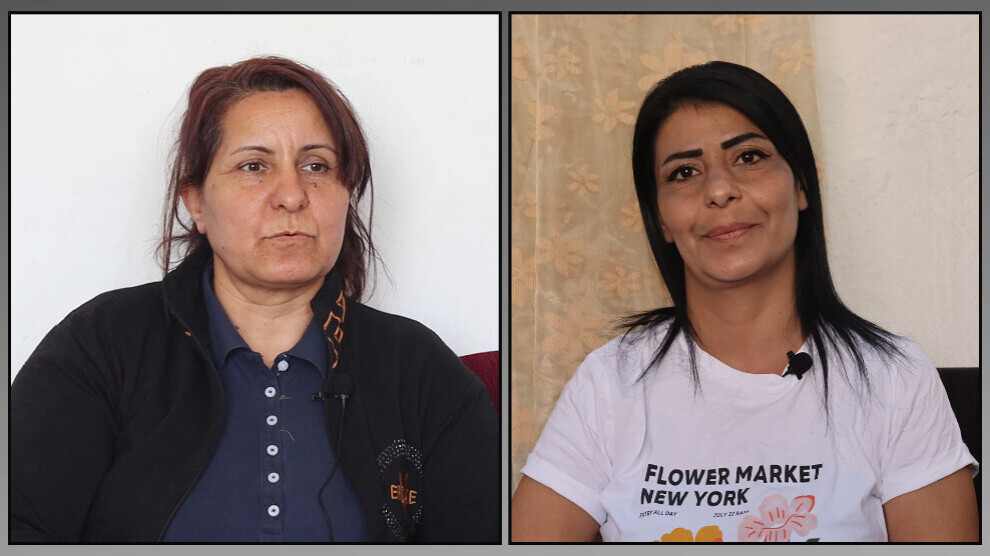Alawite women: Organizing ourselves is the key for change
“Organizing ourselves is the key for change. Thus, we can support all members of our society,” said Alawite women, who were forcibly displaced from Syria’s coastal areas to North and East Syria.

ŞÊRÎN MUHAMED
Qamishlo- The Syrian civil war, which has been ongoing since 2011, has affected all segments of society, killing, injuring and displacing thousands. The Alawites living in Syria’s coastal regions are among the forcibly displaced people in Syria. Armed militias supporting the Syrian interim government led by Hay'at Tahrir al-Sham (HTS) have committed violations against the Alawite community since March 2025, posing a threat to both the Alawites’ safety and daily lives. The Alawites living in the country’s coastal regions have been subjected to various rights violations such as arbitrary arrests, massacres, forced displacement amid the deteriorating security conditions. This situation has forced many Alawites to flee from their homes to North and East Syria in the hope of finding a safer life.
“We have lost our homes. We came here in the hope of finding a safer life; however, we still live in a constant state of anxiety,” said an Alawite woman displaced from Syria’s coastal regions to North and East Syria. These words reveal the harsh realities faced by the Alawites at a time when the political landscape of Syria is uncertain and the international community is expected to take responsibility for protecting civilians regardless of their ethnic and religious identities.
Mona El-Muhammed, an Alawite woman living in North and East Syria since her marriage, has helped her relatives, having fled from Syria’s coastal regions without taking anything with them. “Following the fall of the Syrian regime, the country was dragged into a period of bloody chaos and division. Civilians, especially the Alawite, Druze and Christian communities, have paid the price of this chaos,” she told NuJINHA. “These people have been subjected to serious violations by the new administration. These violations have targeted everyone, including children, women and the elders.”
‘More than 10,000 Alawites have been killed’
Mona El-Muhammed recommends her friends and relatives in Syria’s coastal regions to come to North and East Syria.
“My home is open to all families, whether Alawite, Sunni, Druze or Christian. There is no room for sectarianism in North and East Syria. People living in Syria’s coastal regions have been subjected to severe violations despite having no connection with the Baathist regime. What has happened there is not a war but a massacre committed against innocent people. We have witnessed how children, women and parents have been brutally killed in the name of religion. Many media outlets have ignored the crimes committed against civilians without reporting the suffering of hundreds of families. Since March 2025, more than 10,000 Alawites have been killed in Syria’s coastal regions. My sister lived in the open area, under trees, for seven days, in the fear of being killed. Girls and women have been kidnapped, and held captive, just like the Yazidi women in the hands of ISIS.”
Mona El-Muhammed called on the international community and the Autonomous Administration of North and East Syria (AANES) to make a joint effort to protect the Alawite community and the displaced Alawites. “We call on everyone to come to North and East Syria, where they can find a safe place and respect.”
‘The AANES warmly welcomed us’
Rawaa Abdul Hamid Al-Muhammed is one of the Alawites women fleeing from Syria’s coastal regions to North and East Syria due to the attacks on the Alawite community. “The Autonomous Administration warmly welcomed us. The people opened their homes to us. After a long journey of suffering, what we have experienced here makes us feel safe. The organization in this region has encouraged us to be a part of this system. Organizing ourselves is the key for change. Thus, we can support all members of our society.”
The displaced Alawites taking shelter in North and East Syria have already begun to establish committees. “The aim of the committees is to improve our current situation and work together for a better future.”
